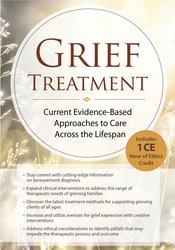Description
-
Alissa Drescher – Grief Treatment: Current Evidence Based Approaches to Care Across the Lifespan
- Faculty:
- Alissa Drescher
- Duration:
- 6 Hours 16 Minutes
- Format:
- Audio and Video
- Copyright:
- Feb 05, 2020
Description
The need for a revolution in the way mental health providers approach grievers is on the rise. The “quick fix” nature of American culture, a death-denying attitude and an outdated adherence to stage theories has created an epidemic for grievers.
The potential is high to include a formalized diagnosis for Prolonged Grief Disorder in the next revision of the DSM-5®. If this occurs, clinicians will have an even greater responsibility to understand treatment modalities, assessment tools and diagnostic criteria related to grief. Not long ago in American history, those in mourning would be quick to find comfort from family and faith. Yet, as our society shifts away from a faith-orientation and loneliness continues to escalate, clinicians have the unique opportunity to stand in the gap of this crisis and provide a respite for grieving people of all ages.
This recording provides fast and unique treatment tools that can be used in a wide variety of circumstances for grievers of all ages. The new complicated Grief Treatment Model will also be examined for use with individuals facing a more persistent response to grief. This treatment has been studied to have a significantly higher response rate than interpersonal psychotherapy.
Handouts
| Manual – Grief Treatment: Current Evidence Based Approaches to Care Across the Lifespan (10.6 MB) | 82 Pages | Available after Purchase |
| Additional Handout (197.7 KB) | 3 Pages | Available after Purchase |
| Burnout Assessment (281.4 KB) | 2 Pages | Available after Purchase |
Outline
Grief Theory Beyond Kübler-Ross
- Tasks of Mourning
- Dual Process Model of Coping
- Continuing Bonds Theory
- Grief and Attachment Theory
- Potential criteria for “Persistent Complex Bereavement Disorder”
- Two creative interventions articulating these theories
Circumstances of Bereavement
- Implications of Specific losses
- Pre-loss factors
- Relationship influence
- Type of and proximity to death
- Disenfranchised losses
- Living losses
Grief Counseling Strategies Across the Lifespan
- Childhood and adolescence
- The occurrence of grief
- Developmental understanding of death
- Grief responses and adaptation to loss
- Six creative age appropriate interventions
- Young and middle adulthood
- Grief circumstances
- Life stages and individual needs
- Assessments and interventions
- Family Systems
- The family narrative
- Use the Internal Family Systems Approach
- Six creative interventions appropriate for middle adulthood
- Older adulthood
- Type of loss
- Grief responses and perception of death
- Treatment strategies based on developmental needs
- Six creative interventions specific for older adults
Grief Treatment – Current Evidence-Based Approach to Care
- Typical Trajectory Griever
- Limitations to grief counseling/assessing effectiveness
- Assessment tools
- Expressive arts
- Companioning model
- Therapeutic presence
- Narrative therapy
- Creating space for suffering
- Limitations of the client-centered approach
- Complicated Griever
- Assessment tools
- CBT
- Complicated Grief Treatment Model
- Grief and trauma intervention
- Meaning reconstruction
- Ethical Considerations
- Socio-cultural context
- Gender bias
- Pitfalls in treating the family system
- Grief in the digital universe
- Spirituality and grief
- Personal death anxiety
- Countertransference
- The wounded healer
- Occupational stress
- The grieving therapist
- Self-care
Faculty

Alissa Drescher, LPC, GC-C, CT, MA Related seminars and products: 2
Alissa Drescher, LPC, GC-C, CT, MA, is a highly sought after speaker addressing topics related to grief and mourning, and is known for her creative, interactive, and story-telling presentation style. She began working in the field of bereavement services in 2006, offering encouragement to grieving parents. Alissa’s passion for supporting people through the grief process led to counseling both grieving children and adults in individual and group settings.
At the Tristesse Grief Center in Tulsa, OK, she served as senior program director, overseeing a variety of programming including the Healing Hearts Camp, Oklahoma’s first overnight camp for grieving children and teens (now Camp Erin Tulsa). Alissa was an adjunct professor at Southern Nazarene University teaching several undergraduate counseling courses including Death, Grief and Loss. After relocating to Tennessee, Alissa became the founder/executive director of the Grief Center of Middle Tennessee, whose mission is to help children, teens, and adults cope with loss and change.
Alissa is a Fellow in Thanatology: Death, Dying & Bereavement and holds a Master of Arts in Marriage and Family Therapy with a focus in Play Therapy. She is also a member of the Association of Death Education and Counseling and the National Alliance for Grieving Children.
Speaker Disclosure:
Financial: Alissa Drescher is the founder and executive director of the Grief Center of Middle Tennessee. She receives a speaking
honorarium from PESI, Inc.
Non-financial: Alissa Drescher is a Fellow in Thanatology. She is a member of the Association of Death Education and Counseling; and
the National Alliance for Grieving Children.







Reviews
There are no reviews yet.